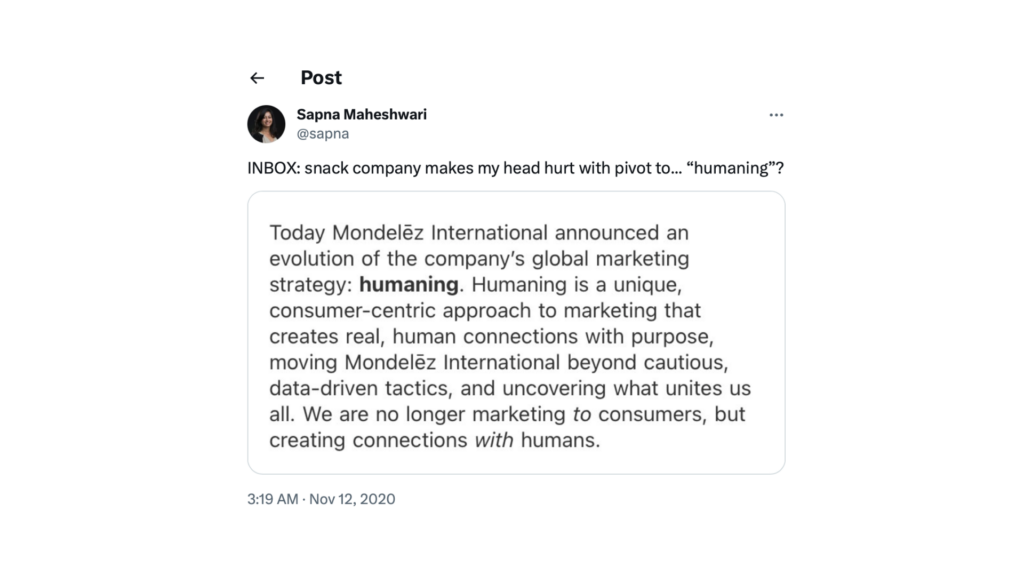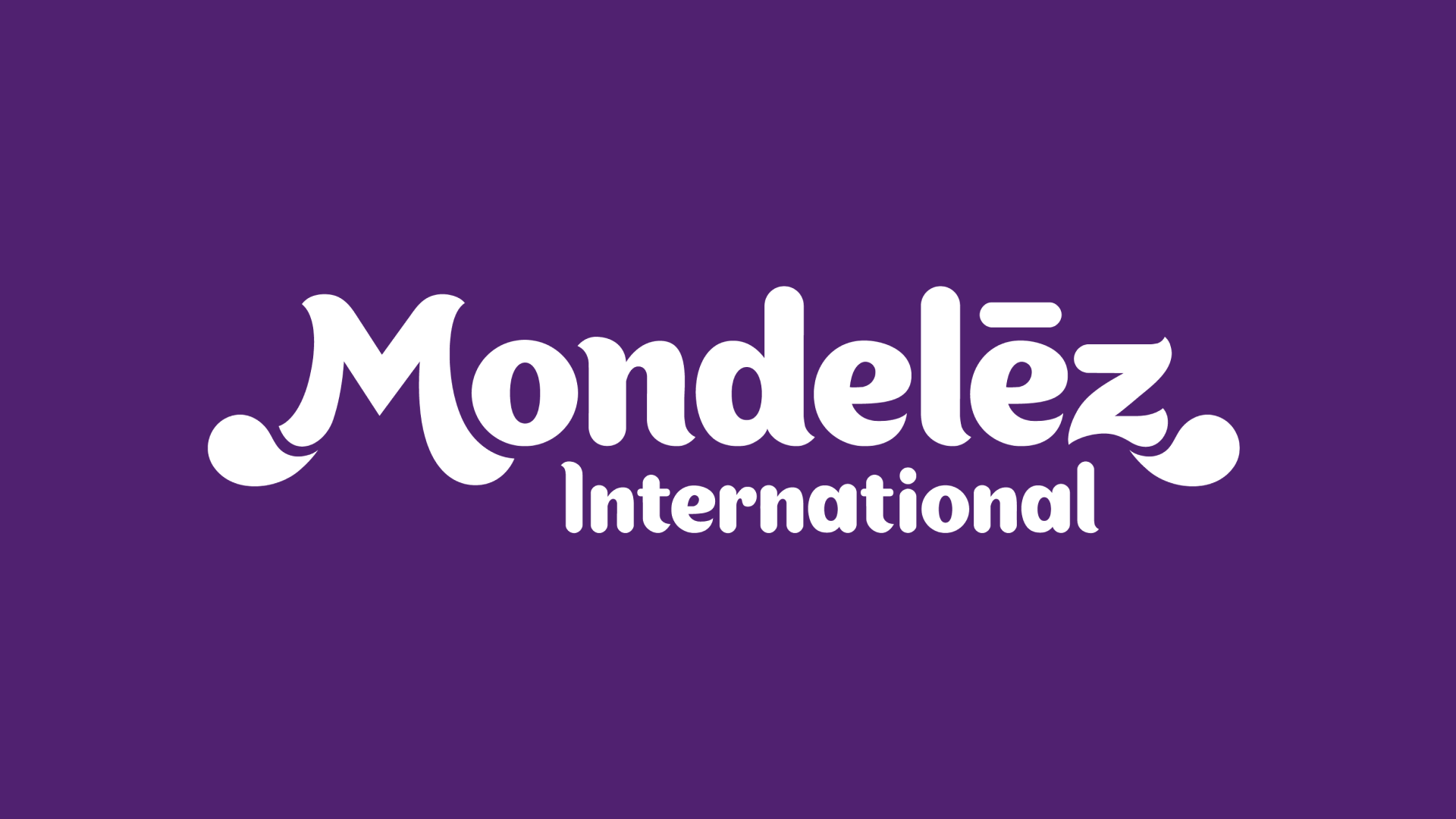We all get it. You have to write the feel-good fluff that will please your CMO, or the board—the marketing mission equivalent of cotton candy. We’ve all been there. But Mondelez marketing team, you did this to yourselves. And perhaps the person who conjured up this gemstone has not yet accrued enough distance from the mirthful days as glee club social chair. It happens.

Only an industry that has been clinging to a thread of legitimacy like advertising can have so many buzzwords. It is, in fact, this euphemistic flatulence that gives purchase to our clinging, and Humaning is just the latest installment in a decades-long series of this type of piffle.
“Our business is infested with idiots who try to impress by using pretentious jargon.”
David Ogilvy
Let’s dissect the statement:
“Humaning is a unique, consumer-centric approach to marketing…”
Saying that your marketing approach is consumer-centric is like saying you write sentences that have subjects. The purpose of marketing is customer creation. That’s all. A rose by any other name will never be called humaning because it already has a name. Marketing.
“…that creates real, human connections with purpose…”
Hmm. Mondelez sells food. It is not Facebook. Human connections is a stretch, and human connections with purpose via checkout rack confections is a lottery ticket. However, it could happen, let’s not go completely to Negative Town. For example:
[Subway platform. Two people sitting on plastic chairs, backs to each other]
P1: “Oh god, I love Cadbury chocolate. [nom, nom] Mmm…”
P2: “[Nom, nom] Are you…talking to me?”
They turn to each other, chocolate smeared on pouty lips, the moment freezes, and is dilated-pupils electric.
P1: “Oh, I…well…hi.”
P2: “Hi. I…”
P1+P2 simultaneously: “SHALL WE HOOK UP, HAVE A NIGHT OF PASSION AND CHOCOLATE AND THEN GO JOIN GREENPEACE?”
Human connections with purpose.
“…moving Mondelez International beyond cautious, data-driven tactics…”
Right. Data is feedback. Data tells us what we are doing right, and more important, the other kind. When you were 8, you decided to stick your tongue to a very frozen piece of ice, the car door handle in February, a flagpole. You know the rest. What followed is an important data point on the timeline of your life. Abandoning those silly data-driven tactics because they are cautious is like driving on one of those scary-ass roads in the Andes where you have a nearly vertical mountain on one side, and 1000 feet of air on the other, and the driver, euphoric with humaning says, “Hey, let’s stop being cautious and remove the steering wheel.”
“…uncovering what unites us all.”
When the now steering-wheel-less vehicle meanders over the side, embraced by divine forces accelerating you at 9.8m/s/s, and then you become one with the rocky reality below, indeed, you will be “uncovering what unites us all.”
“We are no longer marketing to consumers but creating connections with humans.”
We make 35,000 decisions each day, and they are all non-conscious. The automatic cognitive program that causes an impulse purchase of Oreos really does not represent a connection, at least not in the way you insinuate. No one will ever reach for the Oreos, wipe a tear, and think, “Wow, those Mondelez people are so wondrously kind and generous and purposeful, I wish I could hug them.” I’m sorry. Really, I am. It’s just the way we are wired. There is very little thought happening at all when we toss a bag Oreos in the cart.
Let’s be fair about this critique, though. Most likely it is a case of good intentions coupled with a dearth of facility in literary expression, a common affliction amongst my ad land ilk. We tend to recycle the same hackneyed sound bites a lot, as if our limited industry vocabulary contains only a few options from which we are bound to choose: “right message, right time, right person,” despite that being impossible at present; or “Data-driven, idea-led, innovation-inspired,” or the other permutation, as seems to be the claim on 87.54% of ad shop websites. Alas, I capitulate and confess that it’s also easy to point a finger and sing that condescending 3rd grade song whilst doing a wiggly dance. Thusly, I willingly imbibe my own medicine, strap on their shoes, and walk a mile.
First, I’ll reverse engineer the statements to a brief.
“Humaning is a unique, consumer-centric approach to marketing.”
Translation: we want you to know that we are group of people who care about what we do, we care about customers and fans. We are not only a corporate machine that exists solely to generate profits, we are attempting to inject humanity into our commercial endeavors and we hope we convey that effectively such that you’ll feel it. Somehow we landed on “consumer-centric” but telling you we actually have beating hearts in our chests is what we really mean.
“…that creates real, human connections with purpose…”
We believe that when you buy our stuff, you want to feel that we have a humanitarian purpose, that we are giving back. And because we think you feel that, we want you to feel that we feel it. Given what we said above, human caring and purpose, well, they go together like crispy chocolate cookies and white, sugary shortening. We’re sincere when we say that our intentions are good, even purposeful. So the vague human connections that we may have referred to are actually our intention to share the love that we have for people, and we hope you’ll think of our products as modes of love conveyance. Share them and consume them in the name of love.
“…moving Mondelez International beyond cautious, data-driven tactics, and uncovering what unites us all.”
Please don’t think of us as people usually think of marketers: less trustworthy than even lawyers and politicians. When we say we are tossing the tactics to be genuinely human, this is us as John Cusack holding up the cassette player blasting In Your Eyes by Peter Gabriel. Sure, we’ll keep using google analytics, let’s be real, but goddammit, we are so full of love for you and our other fellow humans that we’re willing to risk some public embarrassment by shouting it in the town square.
“We are no longer marketing to consumers, but creating connections with humans.”
You know that moment when the Death Star blows? Remember how you felt? Ok, feel that and read the sentence again. You are not a consumer, you are a person, a living, breathing, cat-video watching, crying, instagram-scrolling human being, so if we ever refer to you as a consumer again, punch us in the chocolate eggs. We got our terminology in order, and that is conducive to the humanistic hugfest we are envisioning. As well as lots and lots of snacking.
Mondelez marketing humans, I offer you a rewrite.
Humaning
We are moms, dads, brothers, sisters, coworkers, and friends who feel and breathe and love, hurt and cry and grieve, just like you. We also make snacks, ones you know, and ones that we feel tremendous pride in offering to you. We put our joy and humanity into our work and we will do what it takes to help you feel confident that we are sincere, that this isn’t just a typical puff of marketing air. We mean it. And we will prove it by our actions, by how we interact, and how we exercise our responsibility to give back. We want you to hold us accountable.
In fact, our purpose is to increase your joy by way of our snacks, the same ones enjoyed by generations. We are real people and our purpose is to make and market products that enhance our happy moments together, bring smiles when we are down, and bring richness to our collective experience of life.



